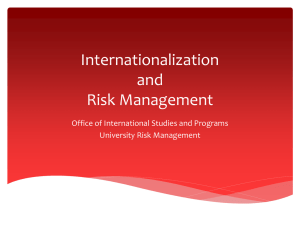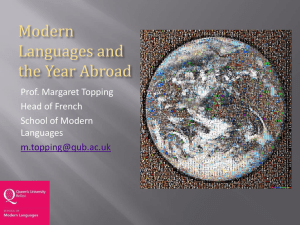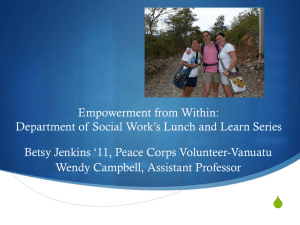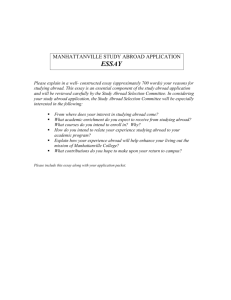Make the most of your time abroad…
advertisement
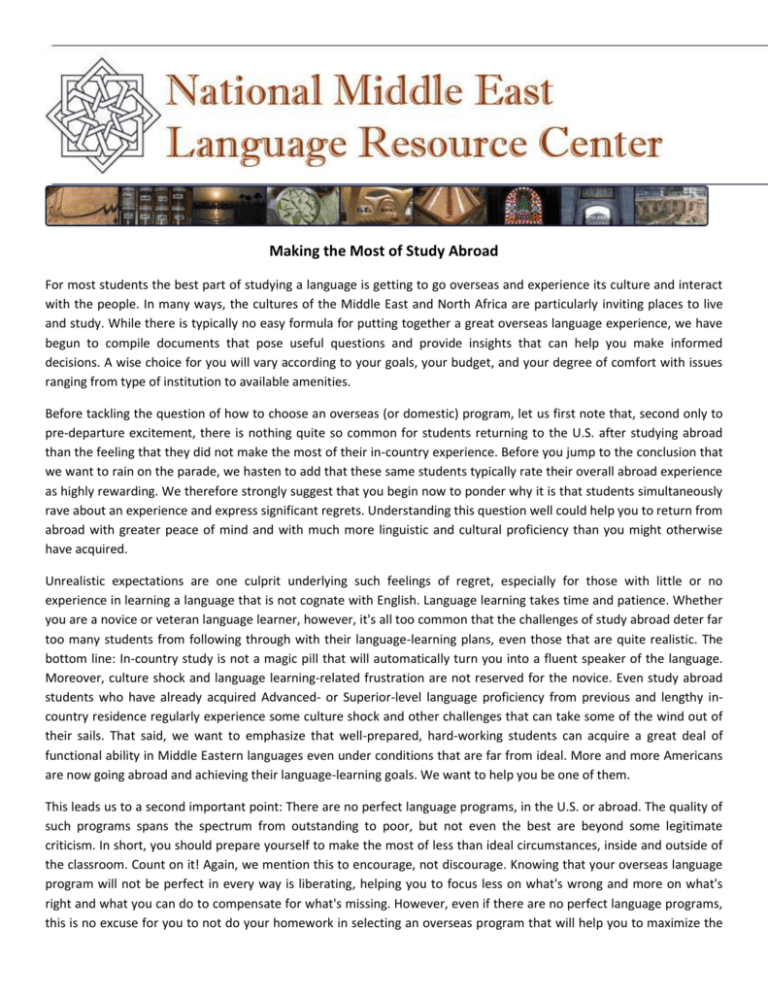
Making the Most of Study Abroad For most students the best part of studying a language is getting to go overseas and experience its culture and interact with the people. In many ways, the cultures of the Middle East and North Africa are particularly inviting places to live and study. While there is typically no easy formula for putting together a great overseas language experience, we have begun to compile documents that pose useful questions and provide insights that can help you make informed decisions. A wise choice for you will vary according to your goals, your budget, and your degree of comfort with issues ranging from type of institution to available amenities. Before tackling the question of how to choose an overseas (or domestic) program, let us first note that, second only to pre-departure excitement, there is nothing quite so common for students returning to the U.S. after studying abroad than the feeling that they did not make the most of their in-country experience. Before you jump to the conclusion that we want to rain on the parade, we hasten to add that these same students typically rate their overall abroad experience as highly rewarding. We therefore strongly suggest that you begin now to ponder why it is that students simultaneously rave about an experience and express significant regrets. Understanding this question well could help you to return from abroad with greater peace of mind and with much more linguistic and cultural proficiency than you might otherwise have acquired. Unrealistic expectations are one culprit underlying such feelings of regret, especially for those with little or no experience in learning a language that is not cognate with English. Language learning takes time and patience. Whether you are a novice or veteran language learner, however, it's all too common that the challenges of study abroad deter far too many students from following through with their language-learning plans, even those that are quite realistic. The bottom line: In-country study is not a magic pill that will automatically turn you into a fluent speaker of the language. Moreover, culture shock and language learning-related frustration are not reserved for the novice. Even study abroad students who have already acquired Advanced- or Superior-level language proficiency from previous and lengthy incountry residence regularly experience some culture shock and other challenges that can take some of the wind out of their sails. That said, we want to emphasize that well-prepared, hard-working students can acquire a great deal of functional ability in Middle Eastern languages even under conditions that are far from ideal. More and more Americans are now going abroad and achieving their language-learning goals. We want to help you be one of them. This leads us to a second important point: There are no perfect language programs, in the U.S. or abroad. The quality of such programs spans the spectrum from outstanding to poor, but not even the best are beyond some legitimate criticism. In short, you should prepare yourself to make the most of less than ideal circumstances, inside and outside of the classroom. Count on it! Again, we mention this to encourage, not discourage. Knowing that your overseas language program will not be perfect in every way is liberating, helping you to focus less on what's wrong and more on what's right and what you can do to compensate for what's missing. However, even if there are no perfect language programs, this is no excuse for you to not do your homework in selecting an overseas program that will help you to maximize the benefits of your time abroad. The better the language program, the more likely you will have a highly successful experience in acquiring proficiency in the language and its culture. No program is perfect and no program can be all things to all people, so beware of such claims. If you are seeking a level of proficiency that will qualify you for a particular job that entails only the most pragmatic use of the language, you may well choose a different place to study than if you are planning for an academic research career. The following are important considerations to help you choose an overseas program: What is the institution's mission and track record? Whom do they hire and how do they train their faculty? What quality control measures does the institution have in place? Many programs are so overwhelmed by the growing number of students now studying abroad that they struggle with staffing and maintaining adequate oversight, in spite of the best of intentions. Find out what, specifically, the program has in mind for you to learn and how well this fits your needs and interests. Will credit from the program transfer readily to your home institution (if credit is a concern)? What objective indicators of program quality can they provide? What is the length of the program and how is it structured? A shorter program of two to six weeks may be advisable for you, if you are just testing the water but don't expect to jump ahead a year back at your home institution, unless its language program is mediocre or worse. Longer intensive programs are a must for significant language proficiency improvement. Go abroad for a semester or academic year if you can, but also know that good results can accrue during nine or ten weeks of solid summer study. Time, of course, is no guarantee. Time on task is critical. "Task" doesn't have the best of connotations so you want to make sure your time on task doesn't seem burdensome. If your language journey is one of discovery and rich personal association with speakers of the language, it won't be. The more enjoyable you find the learning and language-using experience and the more relevant you perceive it to be to your life and interests, the more time you'll spend in the language. If you find yourself spending lots of time hanging out with Americans, surfing the web, distracted by various annoyances, or otherwise engaging in subtle or notso subtle avoidance behaviors, figure out what you need to do to fully engage. Don't be too hard on yourself. Everyone needs a break now and then. Enjoy the journey. Language learning is not a sprint. Good coaching can make a big difference. Find out what type of advisement, if any, is available. Do those providing such advisement really understand the needs of American students? Do they seem to fully understand yours? Ideally, you'll have easy access to role models and coaches who've succeeded at doing what you want to accomplish. Discouragement is by far the number one enemy of forward progress in study abroad learning contexts (and many others!). Teachers and coaches who understand how to help you deal with this and "stay in the game" will go far in helping you maximize your time in country. If, however, you find yourself in the situation where you do not enjoy such a support network, you will need to work doubly hard to compensate for these circumstances, including setting aside time to regularly take stock of how you're feeling, how engaged you are. We strongly suggest that you do all in your power to find friends and tutors from the country who: 1) believe in your ability to learn the language; 2) make you feel good about yourself and your ability to learn it; 3) appropriately challenge you to use the language. You should also find out as much as you can about the other students that you will be studying with and what the maximum class size is. The people in your classes may well contribute to what you'll learn as much as or more than the teacher(s). A class of well prepared and highly motivated students can lead to a very productive experience inside and outside the classroom. Your choice of country or city will also influence important considerations, such as cost. Some areas are far more expensive than others. More remote cities may help to insulate you from those who speak English well, but they may also offer fewer amenities. Others will thrive in big cities with all the excitement and opportunities they offer. Climate and the availability of air-conditioned housing and classrooms can make or break the experience for some. Some students will do better in smaller cities or in private institutes that offer a more personalized learning experience. Each context has its pros and cons. Take time to be sure you know what you want and what you need so that you can choose accordingly. Some overseas language programs can play an invaluable role in helping you to find suitable housing, conversation partners, service learning opportunities, and internships. Find out if they offer such services. Most importantly, we urge you to prepare well to have a safe and healthy experience. Traffic accidents are typically the most serious threat. As you consider choosing a place to study and as you prepare to go abroad, please consult the State Department's website, as well as your university's risk management team's website, to insure your safety and wellbeing. Getting answers to all of these questions will require you to search well beyond an institution's website. Ideally, you'll find your information from an impartial source. Experienced language professionals based in the U.S. are one excellent source of such information. Unfortunately, such people are relatively rare, often overworked, and therefore not readily accessible. The large number of Arabic and Hebrew programs currently available make it impossible for one person to have thorough and current familiarity with all of them. For this reason, we are engaged in a cooperative project with programs located all across the Middle East and North Africa that wish to make reliable and objective information available to students shopping for a quality program. We plan to begin posting such information early in 2009, but for those bound abroad before then there is still much to learn here that can assist you in choosing a program abroad, making the most of it, and making the most of your out-of-classroom experiences. We wish you all the best on your journey and welcome your feedback. In addition to our own region-specific documents, we recommend the following resources: Maximizing Study Abroad: A Students' Guide to Strategies for Language and Culture Learning and Use by R. Michael Paige, Andrew D. Cohen, Barbara Kappler, Julie C. Chi, and James P. Lassegard. University of Minnesota. 2006 (262 pages). Order form found at CARLA Working Papers. This book offers helpful tools and suggestions to help you better know yourself as a learner and make the most of your time abroad and beyond, including: dealing with culture shock, ways to set realistic goals and self-monitor progress, how to be a better observer of linguistic and non-verbal communication, and strategies for learning vocabulary and developing listening, speaking, reading, writing, and translation skills. Maximizing Study Abroad: An Instructional Guide to Strategies for Language and Culture Learning and Use Order form found at http://www.carla.umn.edu/maxsa/guides.html#professionals. A good resource for preparing students for study abroad, the book Maximizing Study Abroad: An Instructional Guide to Strategies for Language and Culture Learning and Use was created for language teachers and study abroad professionals. It is meant as a companion to the Maximizing Study Abroad: A Students' Guide. Study Abroad and Second Language Use: Constructing the Self by Valeria A. Pellegrino Aveni. Cambridge, UK; New York: Cambridge University Press, 2005 (188 pages). An excellent window on the emotional and psychological struggles that are almost universal in language immersion experiences. Few of us enjoy looking foolish; yet living in a foreign culture with limited language ability can be a trying experience. Every student should take a look at this book, even if you don't mind looking foolish just in case. If you do nothing else with it, read the student profiles beginning on page 159 and learn from the experiences of these students of Russian. Pack a photocopy or notes of some of the key lessons you learn from these students so you can review them when you find yourself withdrawing rather than engaging. You'll be glad you did. http://www.nmelrc.org/article/Making%20the%20Most%20of%20Study%20Abroad




